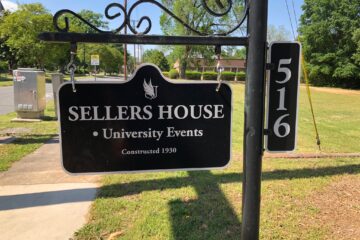Free COVID-19 testing is available on select days at the Winthrop Coliseum and testing is available in Health and Counseling Services, but COVID-19 testing is not mandatory for those who are working, living or attending class on campus.\
Because COVID-19 testing is not mandatory, some question whether the data shown on the COVID-19 Dashboard is accurate.
Dwight Dimaculangan, chairman of the biology department and professor of geology, is appreciative that Winthrop is making their known positive cases public information, but said, “I am concerned that they’re basing [the data] on limited knowledge and so my fear is that [the dashboard creates] a false sense of security, about there being hardly any cases on campus, because I’m not sure that that’s the case, because how they’re doing determined cases.”
The dashboard numbers are determined by how many students, faculty and staff report that they tested positive. Some receive testing either on campus or at the coliseum and those are automatically reported to the university if they are positive, but others who receive testing at other various locations adhere to an honor code in reporting their results.
In an email sent to faculty on Oct. 15, Winthrop President George Hynd wrote, “I hope you have seen our COVID Dashboard and the low numbers of cases we have seen. Vice President for Human Resources Lisa Cowart noted that, while the number of faculty and staff who have been infected continues to be low, through our on-campus contact tracing, we have learned that none of those who have been infected appear to have contracted the virus at work.”
Hynd is optimistic about the number of positive cases on campus but being that most young people who have COVID-19 are asymptomatic, it is likely that there are more positive cases on campus than the dashboard is able to surmise.
On Oct. 22, Winthrop hosted a cultural event called “The Role of Epidemiology in a Pandemic and Public Health Safety,” where Linda Bell, South Carolina State Epidemiologist, spoke about what she knows regarding COVID-19 and how to minimize its spread.
“Testing too much is not a bad thing, it’s how we find cases… if we don’t test people, especially if such a high proportion of people are asymptomatic, we won’t know where [the cases] are,” Bell said.
If Winthrop University were to mandate COVID-19 testing for all on-campus faculty, staff and students, it is likely that more positive cases will surface.
Danielle Owen, a junior dance major, said she would prefer for Winthrop to mandate COVID-19 testing because “it’s important for everyone to be more aware and better prepared.”
With the positivity rate in South Carolina being over 5%, according to the CDC, many South Carolina universities are mandating COVID-19 testing on their campuses.
For example, College of Charleston is mandating COVID-19 testing for all on-campus residents.
“COVID-19 is now one of the leading causes of death in South Carolina,” Bell said. “[According to] the New York Times [on Oct. 22], South Carolina is ranked seventh among the 10 states with the most cases reported on college campuses.”
According to the chart Bell was referring to from The New York Times, South Carolina has alarmingly similar data to Pennsylvania which is a much larger state with far more colleges. South Carolina has 8,843 positive cases at 28 schools and Pennsylvania has 9,196 at 98 schools. South Carolina’s COVID-19 statistics are cause for concern for many students, faculty and staff at Winthrop and many are wondering why Winthrop is not mandating COVID-19 testing while others are privy to the fact that undertaking mandatory testing requires a lot of manpower that Winthrop may not have.
“It would have to be repeated on a weekly basis to be effective. [That is] unrealistic in my opinion,” Lindsey Sturgis, a Winthrop alumna, said.
“We do not have plans at this time to test all students, staff and faculty at Winthrop. We do not have the financial resources nor the staff to conduct such comprehensive testing. However, we have worked to ensure that testing is available on campus at the Coliseum through DHEC,” Hynd said.
Graphic by Maggie Claytor




